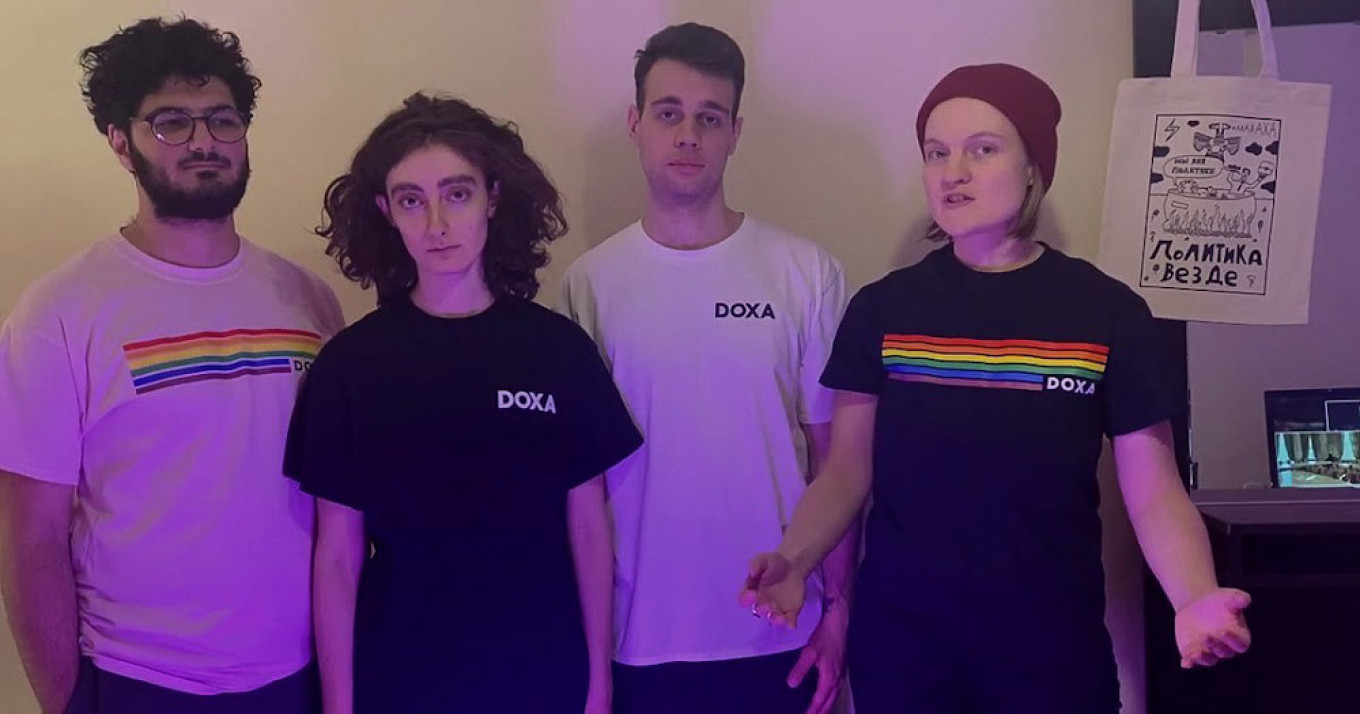
Russian police have raided independent student-run publication DOXA’s Moscow offices and charged leading staffers with inciting minors to illegally protest, the outlet said Wednesday.
Russian authorities demanded earlier this year that DOXA take down its video explaining that students shouldn’t be afraid to voice their opinions at the Jan. 23 pro-Navalny protest and that it was unlawful for universities to expel students who attend. DOXA said it had deleted the video at the authorities’ request and maintains that it contained no calls to illegal activity.
“Today at 6 a.m. [security officers] carried out searches at the DOXA office and the homes of editors Armen Aramyan, Vladimir Metelkin, Alla Gutnikova and Natasha Tyshkevich,” the outlet said on its website.
DOXA’s Telegram channel said that the law enforcement authorities broke down the office door and seized filming equipment. Security officers also searched the homes of Aramyan’s and Gutnikova’s families, the publication said.
All four DOXA staffers have been charged with “inciting minors to participate in illegal activities” after being taken in for questioning by investigators.
Violations of the law are punishable by up to three years in prison.
According to human rights lawyer Pavel Chikov, the charges fall under the same case opened against top Navalny aide Leonid Volkov, who was charged in absentia as he is based in Lithuania.
The publication said in a statement that it will “continue to cover things that are important for young people, and we will continue to stand up for their rights.”
“The pressure that the journalistic community has faced lately is unprecedented, but we will not stop our activities,” the statement said.
On Wednesday afternoon, dozens of supporters gathered outside Moscow’s Basmanny District Court, where the editors were due to be sentenced to pre-trial restraints.
“I came here to support Natasha [Tyshkevich],” Anna, 26, told The Moscow Times. “I believe the whole case has been fabricated and politically motivated. I also believe that journalistic activities should not succumb to political repressions.”
Leonid, 22, chief editor of the city of Kazan’s first independent student-run outlet, said he came to show his support and solidarity with DOXA, who he said set an example for university students nationwide.
“Unfortunately in Russia, everything is arranged so that there are five or six truly independent student publications. There are many of them in general, but very few are willing to criticize the academic community,” he said.
Social media platforms including TikTok and Twitter have been fined millions of rubles for leaving up calls to protest in Navalny’s support that Russia has likened to incitement of minors to participate in illegal acts and foreign interference.
This year’s wave of pro-Navalny protests led to more than 10,000 detentions, dozens of criminal cases against protesters and widespread claims of police violence.
The protests broke out after Navalny was arrested upon his Jan. 17 return from Germany, where he spent months recovering from a near-fatal poisoning.
DOXA, which was founded in 2017, was stripped of its official status as a student organization in 2019 after Moscow’s elite Higher School of Economics university cracked down on political activism in the wake of that year’s opposition protests.
The searches by security officers are at least the second raids targeting Russian journalists in the past week. Authorities last Friday searched the home of prominent investigative journalist Roman Anin for seven hours in a move he believes is a warning shot to independent media of a renewed clampdown.